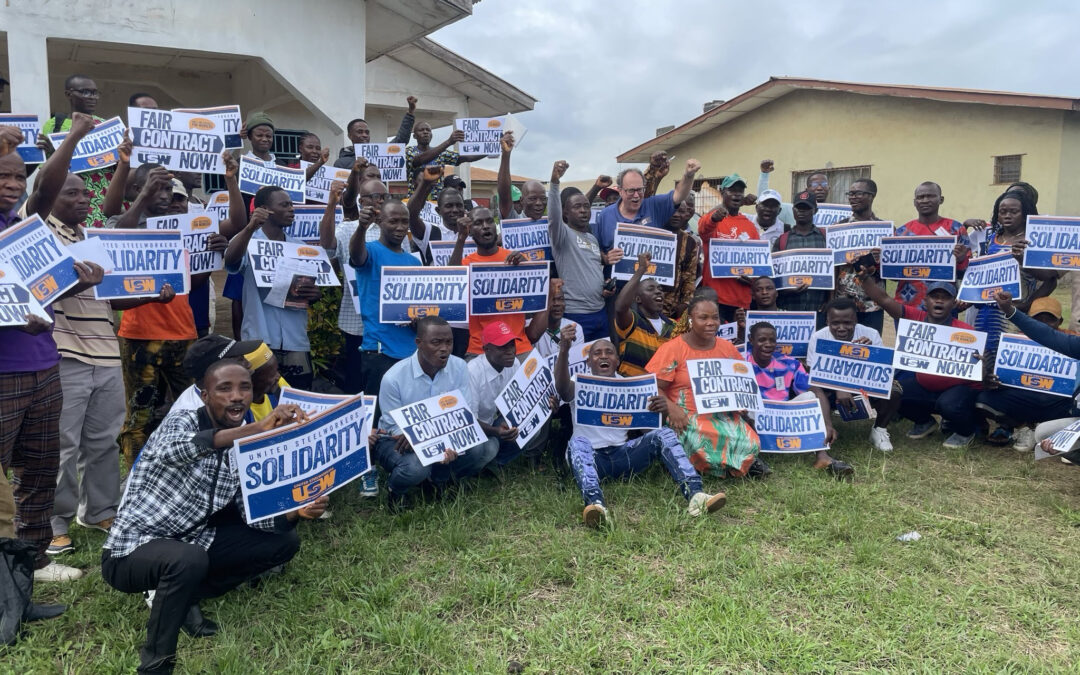
Jun 26, 2025
The Solidarity Center, in partnership with the United Steelworkers International (USW), stands in support of all workers on the Firestone Liberia‘s plantation in Harbel whose low-paid and precarious labor brings raw latex from the plantation to tire manufacturing plants in North America and Europe.
“Now, more than ever, working people have to stick together and work together to win the changes we need,” says USW Vice President Kevin Mapp, who this week attended a series of union workshops at a critical juncture for Firestone Liberia’s contract workers.
The company’s contract workers–who work for lower wages with fewer social protections and benefits as compared to Firestone Liberia’s directly hired, unionized, workers–are poised to negotiate with their employers for a fairer deal. Although more than 90 percent of Firestone-Liberia’s contract workers voted almost nine months ago for union representation, their new union, the Sub-Contractor Workers Union of Firestone (SCWUOF), has yet to achieve its first agreements.
While Firestone Liberia has long profited from the grueling labor of rubber workers, the increasing use of lower-paid contract workers—often denied the rights, protections, and dignity afforded to unionized staff—raises serious concerns under international labor standards and mirrors global patterns of exploitation that have drawn forced labor allegations. This system effectively creates a second tier of workers whose vulnerability is built into the business model, echoing the very abuses international law is meant to prevent.
Safe jobs, healthy communities, fair wages, the ability to care for one’s family and a chance to retire with dignity are the dreams and aspirations of all working people in Liberia and around the world, says the USW.
Firestone Liberia’s contract workers’ efforts to negotiate a fair contract are fully supported by Firestone Liberia’s long-standing union for direct-hire workers: The Firestone Agricultural Workers’ Union of Liberia (FAWUL) has long argued against unfair competition with exploited contract workers, whose numbers are steadily increasing over time.
“We owe it to generation after generation of workers who have suffered to secure good jobs and dignity for ALL,” said FAWUL Chairperson Rodennick Bongorlee immediately after contract workers won their hard-fought election campaign for union representation last year.
Through a “buddy system” of mentoring and regular skills-training workshops, USW’s solidarity campaign is helping experienced FAWUL leaders transfer their collective bargaining and other union-building skills to SCWUOF.
“I’m so proud of the partnership among USW, FAWUL and the new Firestone contractors union in Liberia. We are indeed stronger together,” says Mapp.
By FAWUL’s calculations, some 3,500 full-time jobs were lost from 2019 through 2024 to Firestone-imposed transfers to contract positions, lay-offs and forced retirements. FAWUL in 2007 was awarded the AFL-CIO’s annual George Meany-Lane Kirkland Human Rights Award in recognition of the union’s “extraordinary courage” in successfully organizing more than 4,000 Firestone Liberia workers for the first time in the company’s 82-year existence in the country. Firestone Liberia is a direct subsidiary of Firestone Natural Rubber Company and an indirect subsidiary of Bridgestone Americas – part of the Bridgestone Group.
The Solidarity Center, in partnership with USW International, works with Liberian unions in key extractive industries such as mining and rubber to support them as they better serve their members and assist workers in forming unions.

Jun 3, 2025
When Enoch Gyaesayor logs into a digital app each day to begin picking up passengers and drive around Accra, Ghana, he hopes to get a few hour-long trips where he can be paid the daily top amount from Mondays to Fridays. After paying the company’s commission and job-related expenses, he says he makes 150 cedis ($14.64).

Enoch Gyaesayor, an app-based driver in Ghana, connected platform workers together in a union to build strength to improve working conditions.
But most of the time, Gyaesayor and thousands of other digital app drivers and riders are paid even less, and often work up to 16 hours a day, even sleeping in their vehicles to save petrol money going home and to be ready to start working again as quickly as possible. Higher pay on weekends does not reduce the amount of time they must work.
“There is no ‘off’ day for the driver,” Gyaesayor says, noting that he works seven days a week to support himself and his family.
In Ghana and in countries around the world, the Solidarity Center is building strength with platform workers to create a broad-based, global movement in which app-based workers join together to assert their rights, protect their lives and improve working conditions. Unions and worker organizations are making democracy real in workplaces, legislatures and global forums.
Digital Platform Work: A Growing Industry that Undercuts Labor Rights
A rapidly exploding industry, digital platform work now employs between 154 million and 435 million workers in online jobs. While often seen as a flexible job arrangement, digital app-based work is a growing business model that systematically undercuts labor rights and protections and shifts the responsibility of costs to workers.
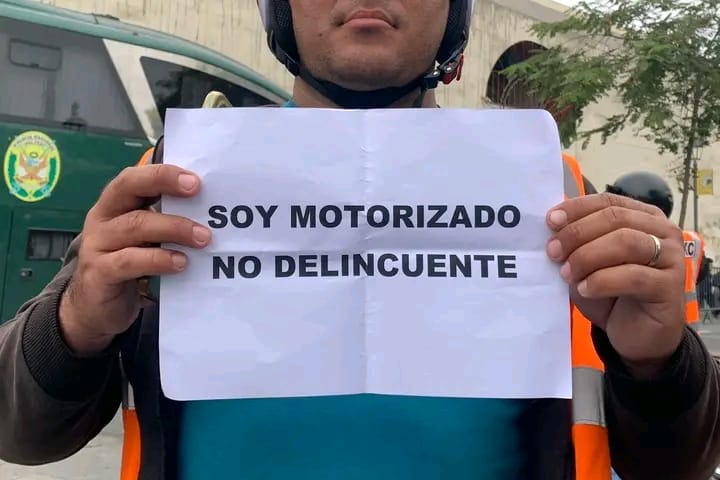
With support by the Solidarity Center and the CGTP, digital platform drivers formed a union to collectively push for decent work and are now at the ILO in Geneva urging passage of a treaty improving work for platform workers worldwide.
Around the world, consumers depend on digital platform workers—requesting rides from Uber or Bolt, ordering meals from Zomato, receiving groceries delivered from Glovo, or viewing content on a social media platform. The online platform acts as an intermediary between the worker and the employer. For most workers, these jobs are not a “side gig”–they are full-time work.
Yet app-based workers in Ghana and in most countries worldwide are defined as “independent contractors,” and so not covered by national labor laws, such as a country’s minimum wage.
Some 3 billion consumers used online food delivery service—groceries and meals—in 2024. Although global food delivery alone was an estimated $380.43 billion in 2024, the workers transporting the food, driving passengers and moderating online content receive little pay and no safe and healthy working conditions.
Joining Together to Improve Job Conditions
Gyaesayor and other platform workers in Ghana say their top concern is to decrease the percentage of the commission app-based companies require drivers to pay. Uber takes 35 percent from workers’ pay; Bolt, 27.5 percent and Yango up to 25 percent.
The commission fee is only a portion of what workers must pay. With available cars scarce in Ghana, some companies “rent” cars to drivers, adding to a worker’s expense, which also includes mobile phone data, petrol and repairs.
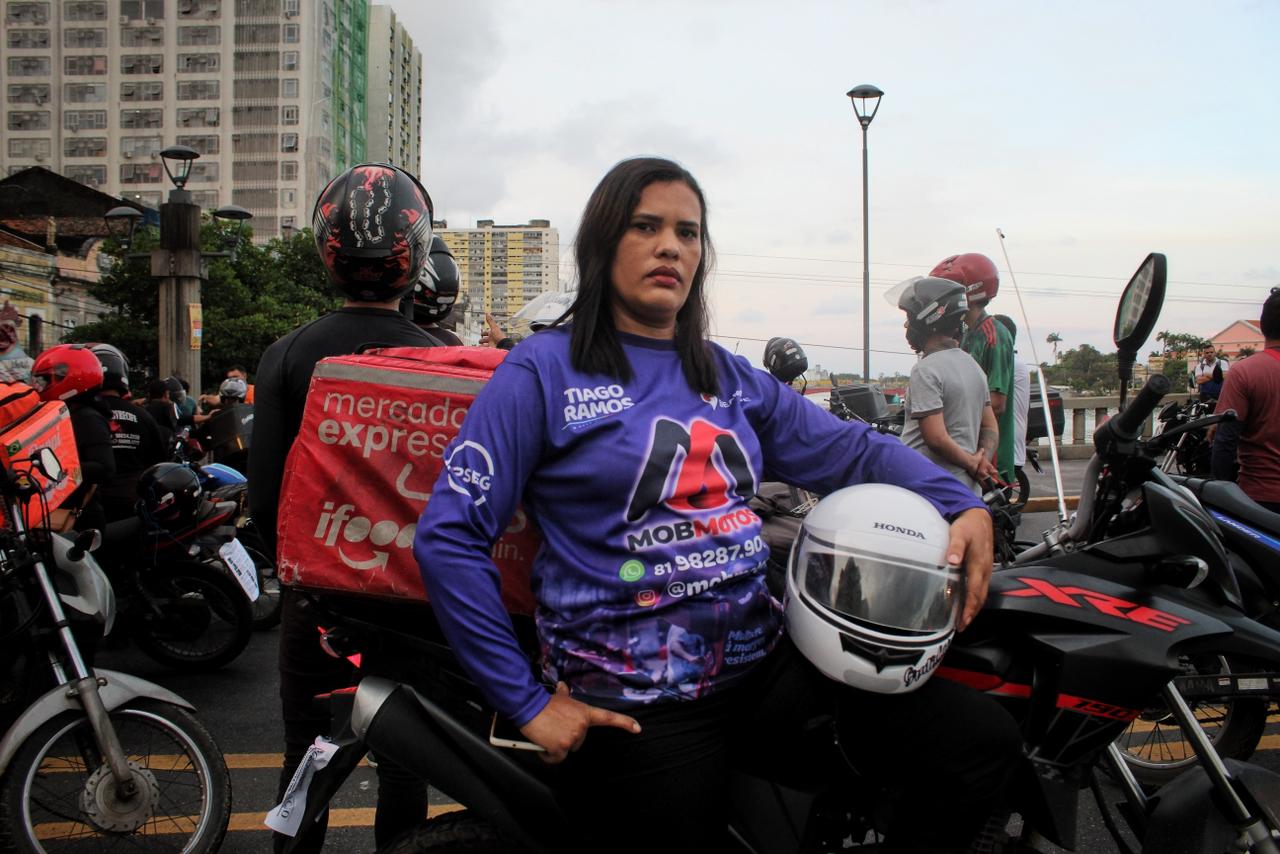
Delivery drivers say they suffer from exhausting workdays, low pay and poor health conditions. Credit: Paloma Luna
Algorithms, which often incorrectly determine distance, time and types of trips offered, further decrease pay. Workers operate at the will of the algorithm and have little recourse to find out why they are locked out of jobs or why kilometers are incorrectly calculated.
“There is a lot of uncertainty and lack of consistency when it comes to rides, how much you will get paid, and so on,” he says.
Gyaesayor, now general secretary of the Digital Transport Workers Union (DTWU), began joining together digital app workers by talking with platform drivers at car parks and shopping malls, urging them to come together to improve their conditions. Several associations representing couriers and other digital workers formed a small association in the Accra and Ashanti regions, By 2023, they created DTWU with a broader reach, joining the Ghana Trades Union Congress (GTUC).
Improve Working Conditions by Joining Together
The digital app union in Ghana, which includes car and bicycle drivers and couriers, is among dozens of platform worker unions around the world, with workers joining together to achieve key goals, including:
- Minimum wage standards.
- Safe working environments.
- Basic social protections such as annual leave, sick leave and retirement benefits.
- Labor law coverage in their countries grants them the same rights as all workers.
To gain these basic rights, workers are engaging in legal action to win unpaid wages, receive compensation for job-related injuries and establish safe working conditions. And, they are mobilizing to improve national and local laws.
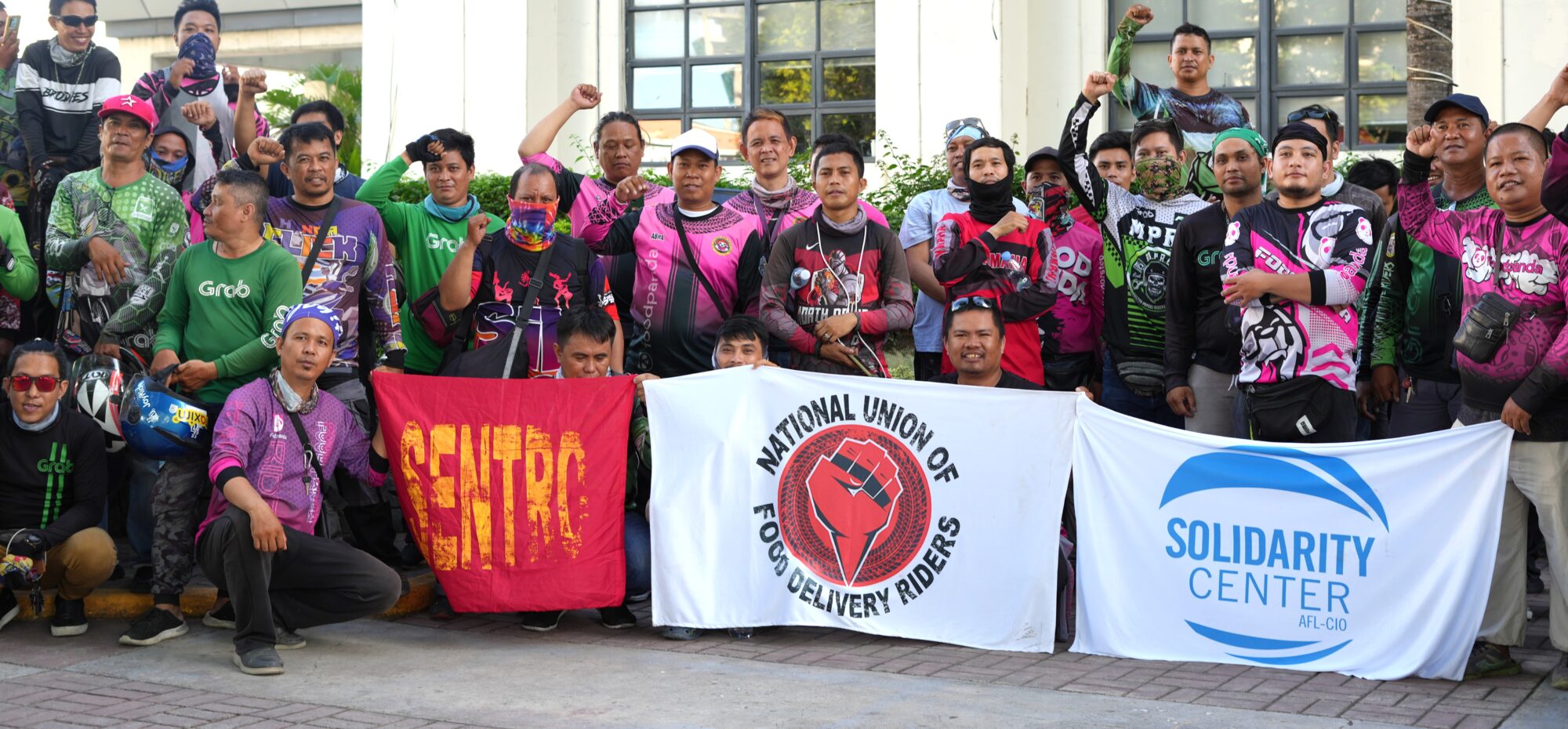
Food delivery riders improved pay at FoodPanda in Cebu, Philippines, part of platform workers’ efforts to assert their rights, protect their lives and improve working conditions.
across the globe.
Earlier this year in Mexico, app-based workers campaigned for — and won! — legislative reform that recognizes them as workers and provides access to accident insurance, pensions, maternity leave and company profits. In the Philippines, food delivery riders are improving benefits around the islands. In Cebu, Foodpanda drivers will receive a base fare of 55 pesos (94 cents) and the company will recognize them as employees.
Now, the workers are joining together to take their demands internationally.
Platform Workers Take Global Action
This week, platform work will be formally addressed for the first time on a global stage. At an International Labor Organization (ILO) conference in Geneva, digital app workers and representatives from business and governments are shaping a new international treaty, Realizing Decent Worker in the Platform Economy.
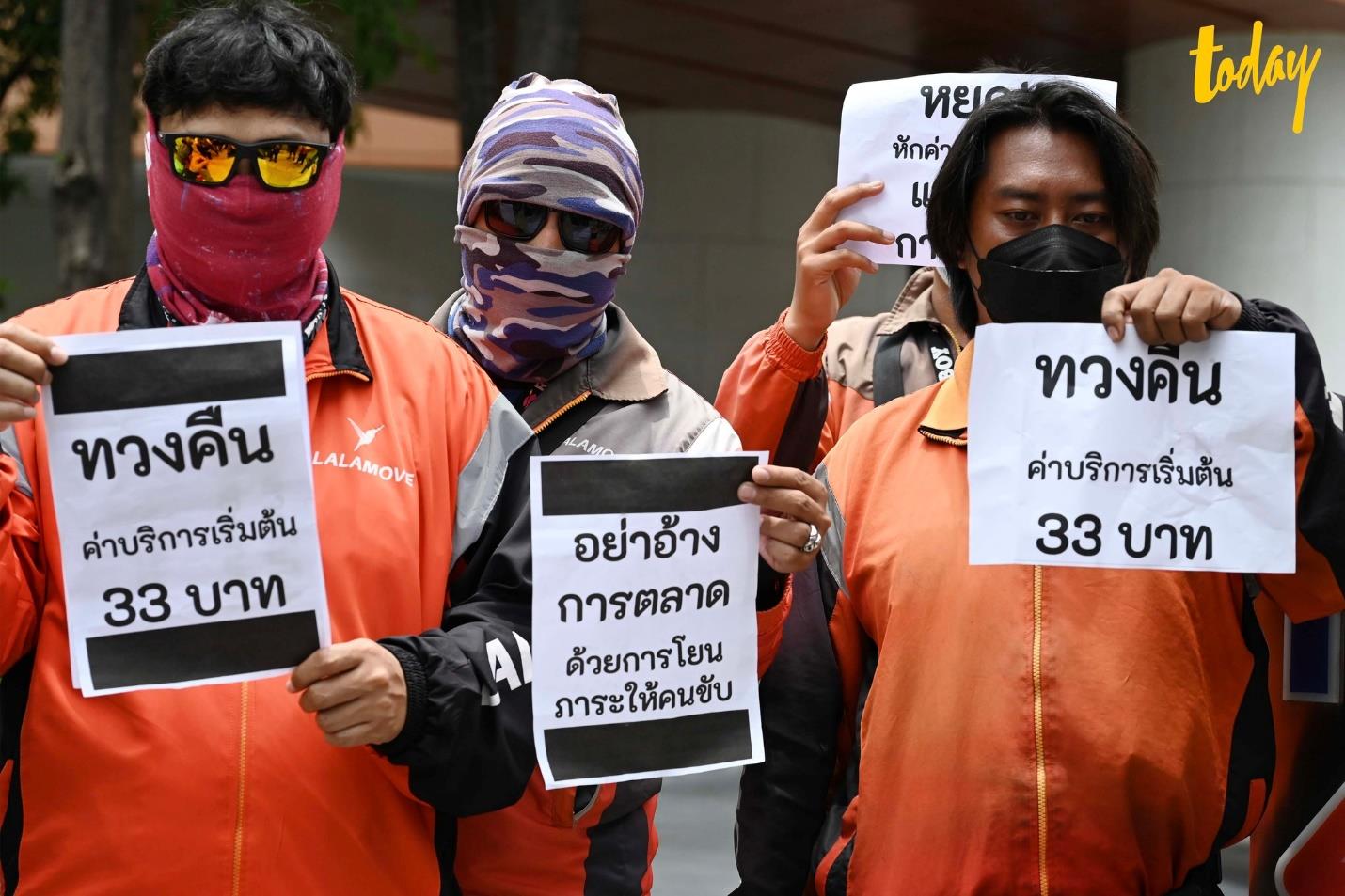
At an ILO conference in Geneva, digital app workers and representatives from business and governments are shaping a new international treaty to ensure decent work for platform workers around the globe.
Digital app workers have been crafting content that delegates will consider, and joining meetings with the International Trade Union Confederation (ITUC) and taking part in a six-day regional workshop in Togo by the ITUC-Africa. Platform workers also are involved in legislative strategies, meeting with their government representatives in advance of the conference.
Charith Attanapola, an app driver in Sri Lanka, met with the country’s minister of labor to convey platform workers’ challenges and discuss ways the government can improve working conditions.
“One of the key takeaways from our discussion was the government’s openness to ensuring decent work across all labor sectors, including app-based transport workers and delivery personnel,” says Attanapola.
Attanapola is part of the Solidarity Center delegation, which includes workers from Brazil, Chile, Ghana, India, Kenya and Mexico. As these workers testify, negotiate and help shape international labor standards that reflect the reality of their work and their demands, they understand the urgency in ensuring how jobs are shaped will determine the future.
In Ghana, where youth unemployment improved from 16.3 percent in 2000 to 5.4 percent in 2024, Gyaesayor knows that gain can be sustained only if decent work is available.
“Platform work has given employment to the majority of the youth; yet those of us who are working are being used like slaves, we get paid barely any salary,” says Gyaesayor. “The government must listen to the union, or things will get much worse; a lot of youth are going to be unemployed.”
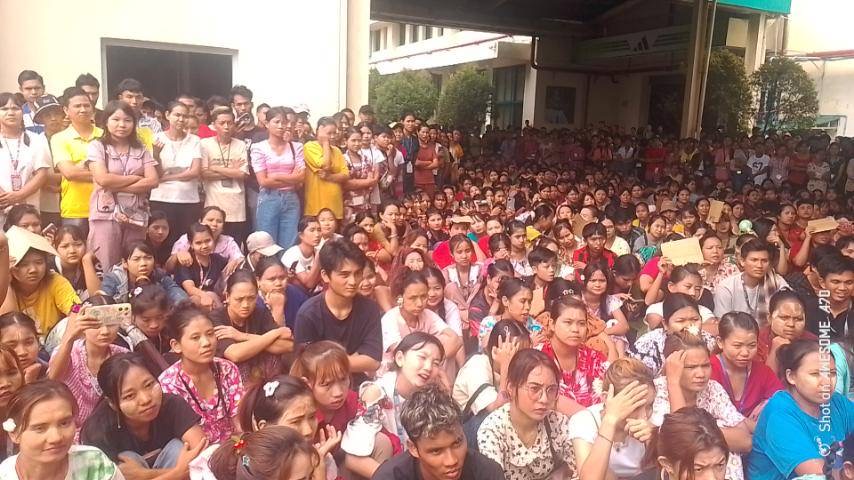
May 28, 2025
Thousands of garment workers seeking to boost a base daily pay of $2.47 (5,200 kyats) stood strong throughout a multi-day strike in Yangon, Myanmar, winning an agreement that increases pay and bonuses.
Marching along the sidewalk outside the factory chanting “daily wage, annual bonus, raise it, raise it,” and “the daily wage you pay is not enough,” striking garment workers negotiated a new wage they say will make it easier to purchase rice and cooking oil.
The agreement, effective in June and covering 6,269 workers, increases the base pay to $2.76 (5,800 kyats), boosts the additional daily allowance to $1.81 (3,800 kyats) from 95 cents (2,000 kyats) and a 19 cent (400 kyats) allowance. Garment workers also will receive an increase in overtime pay and attendance bonus pay.
With Collective Action, Workers Achieve Success
Unable to support themselves on their wages, some 4,000 workers at the Tsang Yih Co., factory went on strike May 14, and were joined by thousands more the next day. Workers remained on strike despite management threats to fire leaders. On May 17, management said the factory, which supplies Adidas, can dismiss them for three consecutive days of absence and told striking workers the company would bring in military soldiers and police.
The garment workers, assisted in their effort for better pay by the Federation of General Workers of Myanmar (FGWM), a Solidarity Center partner, continued the worker action, defying the risks involved in the country. In February 2021, a military coup took power, killing thousands of people and imprisoning many more, with union leaders especially targeted.
After management created a contract without workers’ consent that did not reflect their list of demands, the garment workers remained united in collective action. With military and police trucks at the factory’s entrance on May 19, 6,000 workers rallied inside the factory compound, chanting that the signatures on the “agreement” did not reflect their wishes.
When the Myanmar Labor Minister and other representatives came to the factory urging workers to return to the job, workers say the messages indicated force would be used to disperse them if they refused to resume work.
But with strength through collective action, the garment workers held strong, succeeding in negotiating a contract that benefited them and their families.
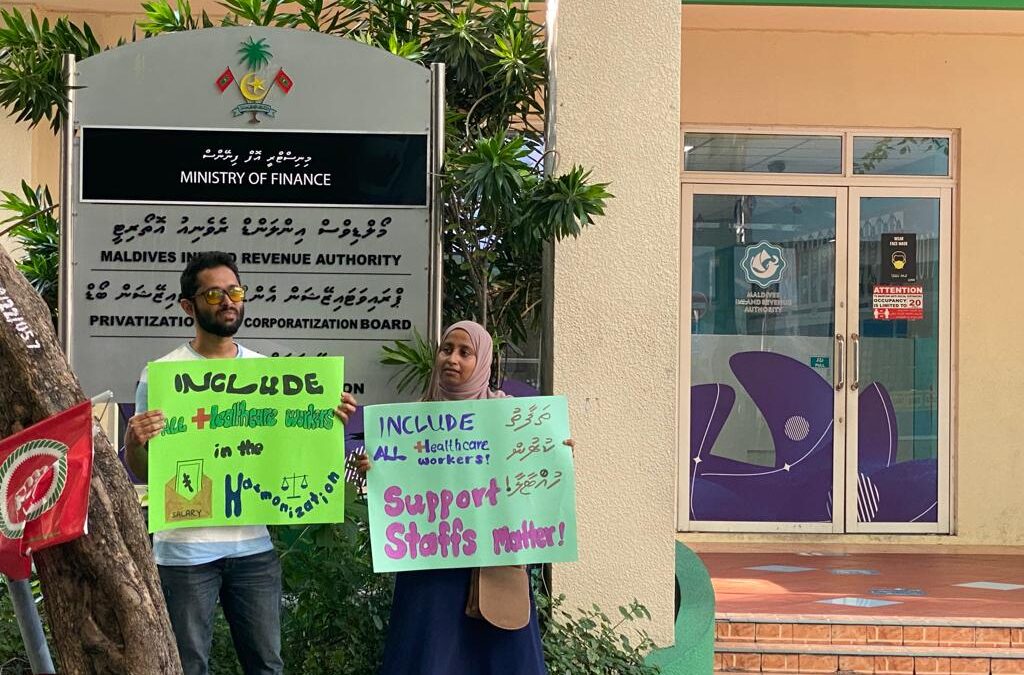
Apr 8, 2025
Health care workers working in the public sector throughout the Maldives will now receive overtime pay in full for all public holidays, resulting from a robust campaign spurred by the Maldives Health Professionals Union (MHPU).

A health care worker holds a sign stating: “Wage theft is a crime–Pay overtime wages.” Credit: MHPU
The new amendment, approved at the end of March, covers all 9,000 government health care workers and removes a 10 percent cap on salary for public holidays. Paid overtime includes all public holidays, such as Fridays, which are part of the official weekend in the Maldives Solidarity Center, an MHPU partner, has provided advocacy and organizing support.
“This recent change, achieved through the relentless efforts of many dedicated individuals, marks a significant step toward ensuring health care workers receive the compensation they rightfully deserve for their tireless commitment,” says Ramsha, a public health program officer.
Staffing shortages have meant nurses and many health care employees regularly work between 40 and 60 hours of overtime each month—all with no pay. Under the new amendment, workers will be compensated if they are assigned extra hours of work during public holidays.
The health care workers often work extra hours beyond their regular schedule, sacrificing their personal and family life. The recent amendment protects wages—- especially during public holidays—and provides additional income protections in the struggling economy.
“They were compelled to work because of shortages,” says Fathimath Zamnia, MHPU general secretary. “Many are kept on call 24/7 and some work 12 hours, with no adequate rest between the next shift.” Hours standing to care for patients resulted in young workers using pain-relief patches, undergoing spinal surgeries and often suffering from chronic illness, adversely affecting families.
“Health care workers are highly service-oriented and often make significant sacrifices,” Zimna says.
Health care workers say that while the amendment does not address all issues related to overtime, “we want to ensure that all workers are safeguarded against unpaid forced labor, as it directly impacts both patient care and life beyond work of the individual.”
Solidarity Center Builds New Strategies
Solidarity Center has played a vital role in providing training and technical assistance to partner unions, including MHPU in the Maldives. The successful overtime campaign reflects the new strategies Zimna and the union gained in both the Solidarity Center’s Global Labor Leadership Institute and Global Organizing Institute. Their new focus facilitated unions to build a grassroots structured organizing campaigns focused on strategies that educate and mobilize workers to build collective power.

“We want to ensure that all workers are safeguarded against unpaid forced labor”–Fathimath Zimna. Credit: Solidarity Center / Mollie Relihan
The public campaign included media coverage in newspapers, involving agitating workers through social media to highlight their struggles. As more workers became involved on Facebook and X (Twitter), two common platforms, more workers reached out using the union hashtag, with their friends and relatives joining.
The healthcare workforce continues to face multiple issues in their working environments, “We are dedicated to strengthening workers’ collective power and continuously striving to achieve better working conditions and improved quality of care,” Zimna says.
Bolstering Worker Wins
Bolstering fundamental democratic principles such as decent wages and safe working conditions, the Maldives Trade Union Congress (MTUC) and MPHU began a years-long struggle for passage of the Industrial Relations Act in 2024, which, with its emphasis on the protection of worker rights, unions say paves the way for economic and social progress.
“The Solidarity Center was a huge partner in the campaign in passing two very crucial [pieces of] legislation,” says Zimna. “The legal proceedings of the campaign were handled by the Public Interest Law Centre, which also was supported by the Solidarity Center. By providing technical and strategic support, Solidarity Center also assisted in conducting training sessions and running educational programs for workers.”
As the union builds the campaign around critical issues facing workers, the Industrial Relations Act provides provisions that “create an enabling environment to form unions, organize workers and achieve collective agreements across all sectors in the Maldives,” Zimna says.In addition, unions succeeded in passage of a Occupational Safety and Health bill that underscores stringent obligations for employers, emphasizing workplace safety standards, compensation frameworks and penalties for non-compliance.
“I feel this is a great win for the union workers. Our rights have been neglected for so long, but we have come so far through our work within the union,” says Shifana Ali, a medical laboratory assistant and active participant in the campaign.
Over the past five years, MHPU, a Solidarity Center partner, has received essential support in advocacy and organizing efforts.
“Workers in the Maldives often are challenged with low wages and poor working conditions,” Zimna says. “A majority of workers in Maldives are migrants, and the growing workforce often is exploited and exposed to unsafe conditions.
“The experiences that we share are similar—as with many workers around the world, the solution lies in organizing workers and building our collective power to resist, fight and win for the workers. We are strongly committed to organizing workers in the Maldives.”
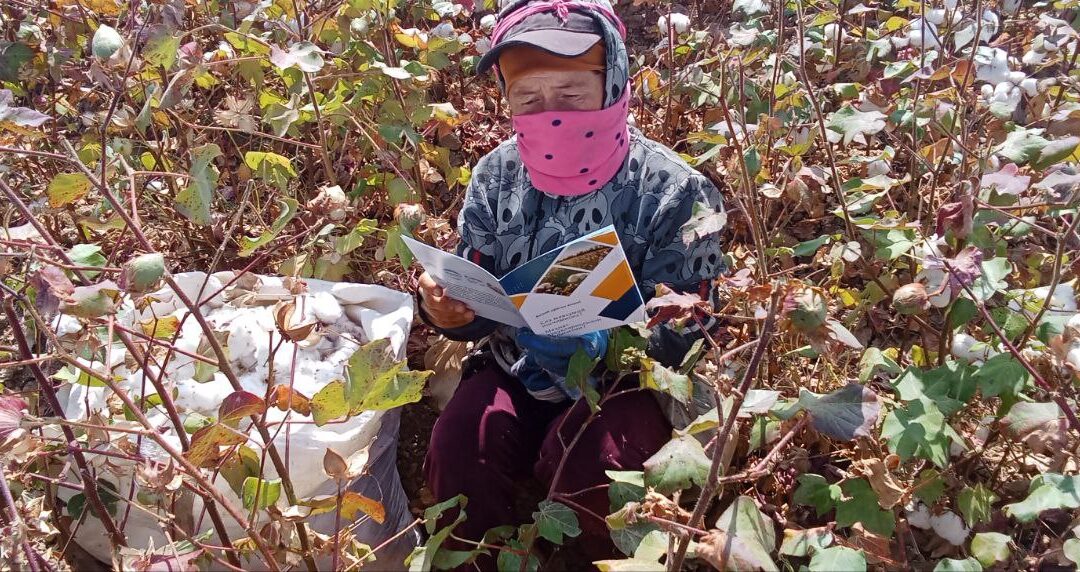
Apr 2, 2025
In Tela, Honduras, where the only major employment is palm production, Iván is one of thousands of Hondurans who depend on his job to subsist. But until Solidarity Center training strengthened the workers’ ability to form a union and gain the strength to negotiate with their employer for decent work, they endured long hours and little pay to care for themselves and their families.
“If we have better conditions here, we won’t need to leave the country,” Iván says, noting his goal is for all workers to have decent living conditions and contribute to the country’s economic development. “That’s why we organize, to have better benefits than those offered by the law.”
Without continued Department of Labor (DOL) funding, palm workers in Honduras will lose access to essential training for achieving decent working conditions, making it easier for them to stay in the country.
This week’s termination of program funding for the DOL’s Bureau of International Labor Affairs (ILAB) eliminates how the United States enforces labor standards in trade agreements, protects American workers from unfair competition and combats child labor, forced labor and exploitation around the world.
Over the years, the Solidarity Center has implemented more than a dozen ILAB-funded projects across Latin America, Africa, Asia and Eastern Europe, including in key U.S. trade partner countries like Mexico, Bangladesh, the Philippines and Honduras. Cutting these programs harms U.S. workers, weakens trade enforcement and abandons the global fight for decent work and human dignity.
The Solidarity Center received $78.3 million in DOL funding for projects over the years. They have helped hundreds of thousands of workers build a better life for themselves and their families. Here are some of the workers’ stories in those programs.
Ending Forced Labor in Uzbek Cotton Fields
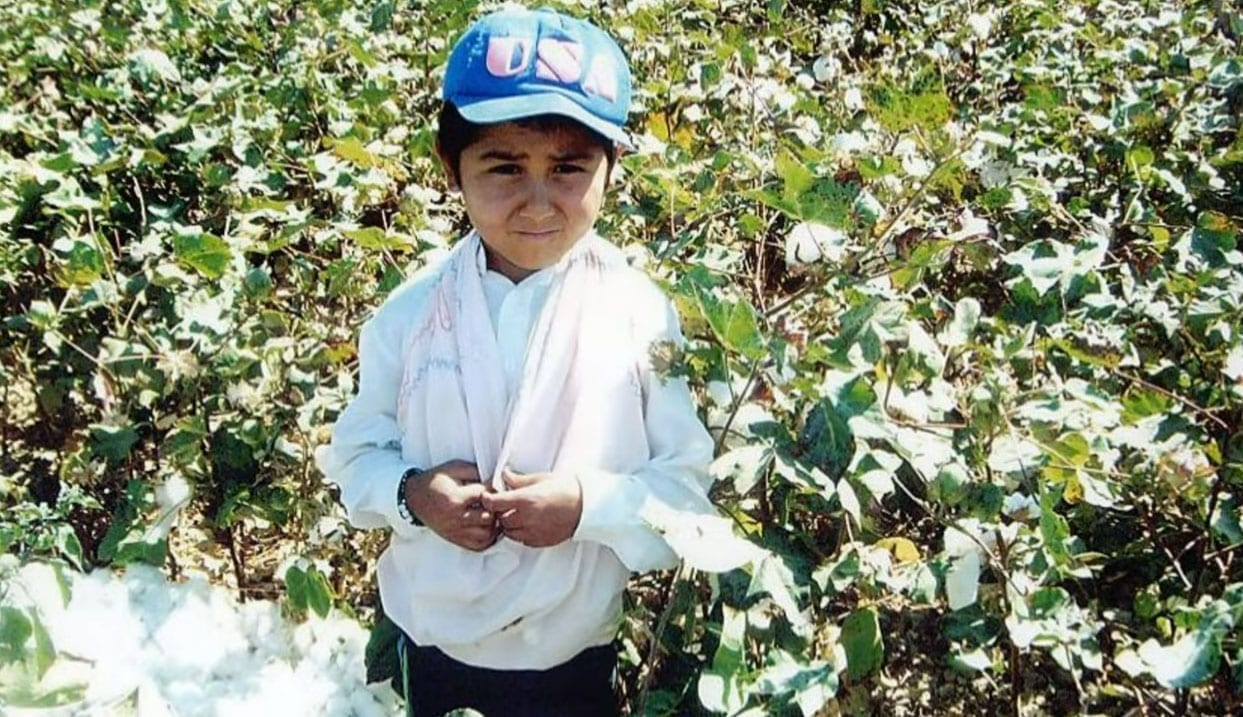 Cotton—in t-shirts, jeans and many household items—is so common, most of us do not give it a second thought. But for decades, millions of people, sometimes including children, were forcibly mobilized by the Uzbekistan government to harvest cotton for state-owned enterprises. Uzbekistan is the world’s sixth largest producer of cotton, producing over 1 million tons annually and employing around 2 million workers.
Cotton—in t-shirts, jeans and many household items—is so common, most of us do not give it a second thought. But for decades, millions of people, sometimes including children, were forcibly mobilized by the Uzbekistan government to harvest cotton for state-owned enterprises. Uzbekistan is the world’s sixth largest producer of cotton, producing over 1 million tons annually and employing around 2 million workers.
The project, now cut with the termination of DOL funding, sought to build on a 15-year effort that successfully eradicated systemic, government-imposed forced labor in Uzbekistan’s cotton supply chain. Through a multi-year global advocacy campaign led by the Cotton Campaign, of which Solidarity Center was a founding member, the government implemented reforms that, in 2021, brought an end to state-mandated forced labor.
To ensure workers who pick cotton continue working in safe conditions, the Solidarity Center signed a groundbreaking cooperative agreement last year with the government of Uzbekistan and other implementing partners to improve working conditions and prevent forced labor.
Ensuring fair labor standards protects U.S. consumers from unknowingly purchasing cotton picked as the result of forced labor, U.S. workers from competing with cotton made cheaper by exploitation and benefits workers in Uzbekistan.
A core priority of the new program would have been ensuring that all cotton sector workers have a written employment contract with enforceable work conditions. Employment contracts ensuring workers receive decent wages in safe conditions are vital, yet absent in many agricultural supply chains. This project aimed to both ensure the reforms to end forced labor in Uzbekistan are durable and help establish Uzbekistan as an alternative sourcing option to forced-labor-produced cotton from other countries.
Better Wages Benefit Mexico, U.S.
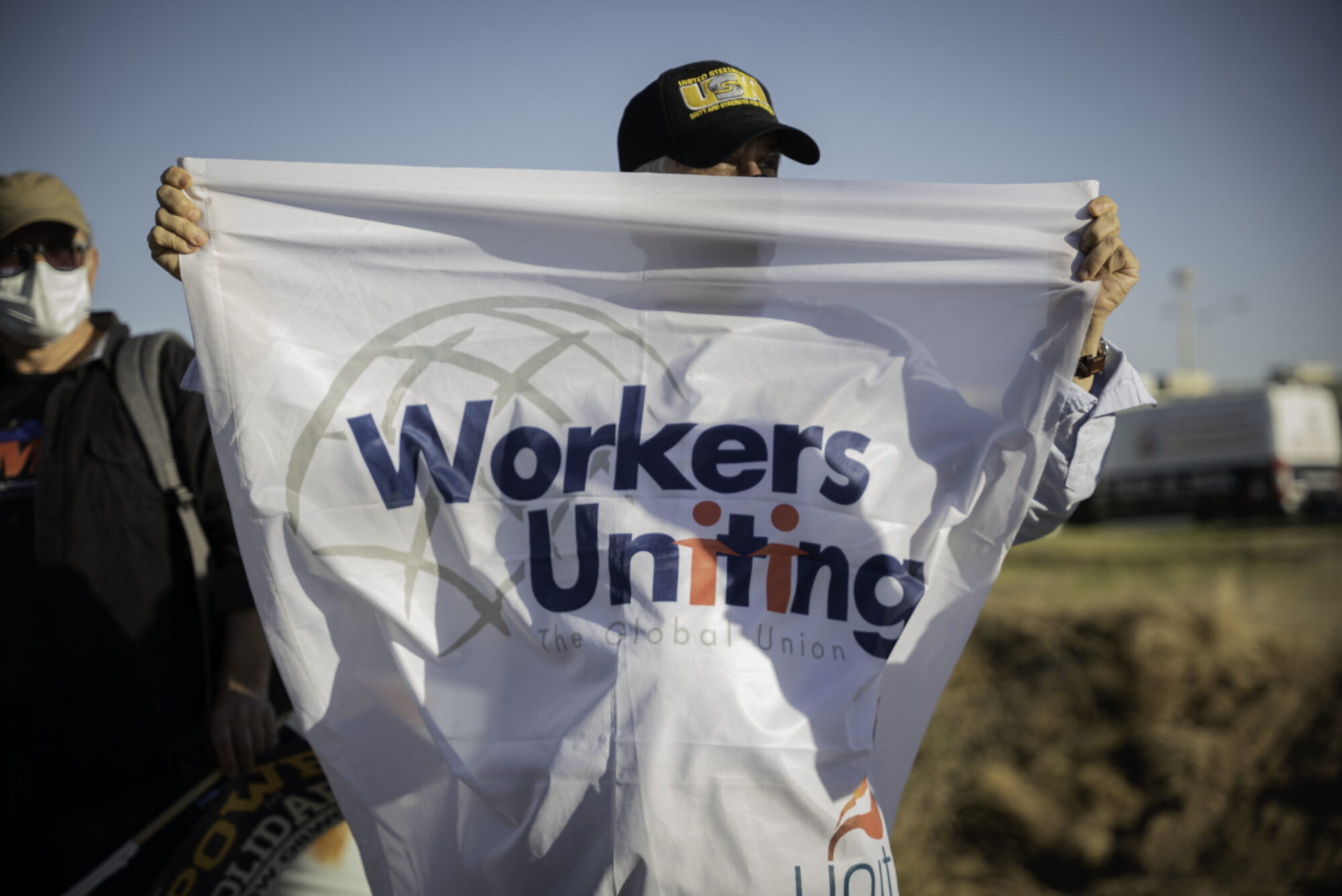
Credit: Arturo Left
In Silao, Mexico, Maria Alejandra Morales Reynoso painted auto parts for years alongside other auto plant workers forced to work double shifts with few breaks, even for the bathroom. Through Solidarity Center training and support, Morales and thousands of workers in Mexico formed an independent union, voting out a corporate-supported union that did not operate in their interest.
The union victory “gave people hope, hope that it was possible to represent workers freely,” she says. “We proved it’s possible to get organized and to fight for our rights and to leave behind the fear that we’re going to lose our jobs.”
The ability to improve their employment sparked momentum among other workers, and bolstered the ability of women to take a role in their jobs, as did Morales, now general secretary of SINTTIA, the union workers voted to form.
A reduction in the wage gap between Mexico and the United States, through authentic and transparent collective bargaining, benefits workers in both countries—by improving the wages of Mexico’s workers and disincentivizing companies from relocating from the U.S.to Mexico to exploit artificially low wages.
Over its 25 years of work in Mexico, especially since the enactment of the United States-Mexico-Canada Agreement (USMCA) and its mechanisms for labor rights enforcement, the Solidarity Center’s efforts have benefited more than 42,000 Mexican workers through USMCA resolutions upholding their rights to freedom of association and collective bargaining and obtained over $6 million in back pay and benefits.
In one case, workers at an auto plant in San Luis Potosí won a 30 percent wage increase through a USMCA ruling.
An informed, empowered, and effective agreement across North America is crucial to counter efforts to undermine the promise of shared prosperity for workers in North America. The termination of DOL funding will negatively impact workers in Mexico and the United States.
Decent Wages for 3 Million+ Mine Workers
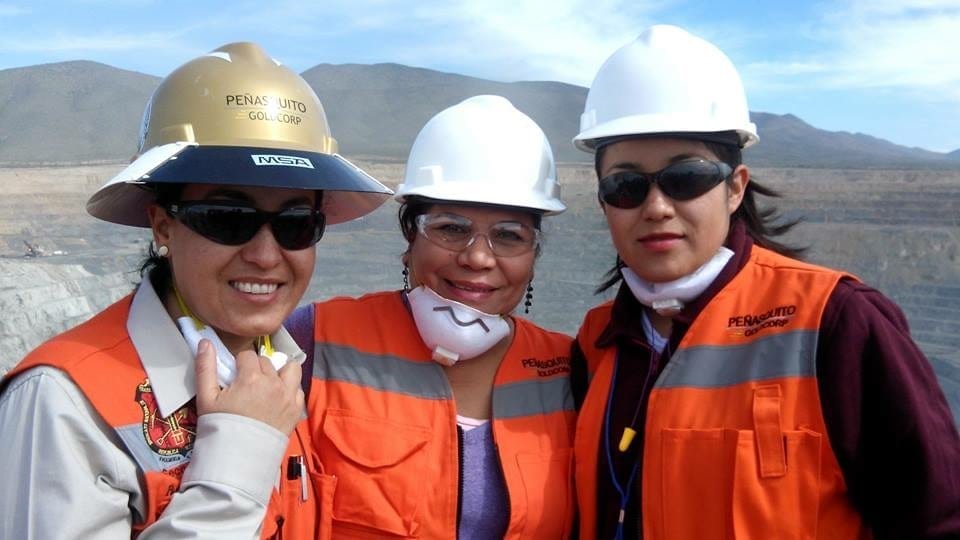
Ruth Adriana Lopez Patiño, Los Mineros, Julia Quiñonez, CFO, and Mariela Sanchez Casas, Los Mineros, all founders of the “Mineras de Acero” (Women Miners of Steel) training program, participate in a tour of a gold mine during a training in February 2015 on gender equality and women’s leadership. Credit: Los Mineros
In Mexico, where Los Mineros represents more than three million mine workers, the Solidarity Center assisted the union in successfully utilizing the USMCA’s labor instrument (Rapid Response Labor Mechanism) in 2022 to achieve union representation and successfully negotiate a strong bargaining agreement with a 15 percent wage increase.
“Thanks to technical assistance provided by the Solidarity Center funded by DOL/ILAB, we were able to use the Rapid Response Mechanism—a tool that helped us achieve justice,” says Imelda Guadalupe Jiménez Méndez, Los Mineros, secretary of political affairs. “Today our contract is 60 percent more beneficial to the workers thanks to authentic collective bargaining.”
Although the Mexican Supreme Court ruled in favor of the mine workers in 2019, it was only through the assistance of the Solidarity Center engaging in the USMCA that Los Mineros successfully negotiated a groundbreaking salary increase and significantly improved working conditions.
Mine workers in Mexico benefited from key Solidarity Center support. Shutting down Solidarity Center funding for the programs jeopardizes life-changing gains in workers’ wages, benefits and conditions and increases pressure on U.S. workers who must compete with low wages in Mexico.
Safeguarding Job Safety and Health
“Pure drinking water, a first-aid box is mandatory at our workplace, as well as women should be paid like as male co-workers,” says one woman who works at a construction site in Bangladesh.
Basic needs—fresh water, medical supplies—and wages to support her family are now accessible through Solidarity Center training that enabled her union leaders to develop a list that included crucial workplace safety and health protections and successfully negotiate to achieve those goals. In a highly competitive sector, where employers can treat workers as dispensable, such lists are essential tools that workers at a grassroots level can use to raise key concerns.
However, DOL’s termination of grant funding means thousands of construction workers in Bangladesh will not have the impact of basic workplace safety and health protections and will have little ability to receive decent wages.
These are only a few examples of Solidarity Center has benefited workers and their communities through DOL funding. Its termination will silence these efforts and undermine U.S. commitments to American workers and workers worldwide.
Halting Workplace Danger
In the electronics industry in Malaysia, the seventh largest exporter of electrical and electronics products in the world, workers producing the semiconductors used to power a range of consumer products endure hazardous conditions and lack job safety and health protections. They often face hazardous conditions, such as exposure to toxic chemicals, which can cause detrimental health effects, including cancers, respiratory issues, and even reproductive harm, including fertility problems and hazards for pregnant women. Often, they are targets of forced labor.
A new Solidarity Center project, which began in 2024, sought to improve occupational safety and health standards and address workers’ access to social benefits such as social security, compensation for injuries, health care and other labor protections. Many of the workers travel from other countries such as Bangladesh, Nepal, Indonesia, Myanmar and the Philippines and face additional challenges in the workplace.
Solidarity Center training, funded by the DOL, sought to strengthen workers’ ability to take part in their workplace and their union and hold leadership positions to promote safe and healthy work environments by building strong and inclusive unions to effectively address OSH in the workplace. Solidarity Center sought to increase engagement by workers and worker organizations with government officials and employers to negotiate, address, resolve and prevent OSH abuses in the workplace through collective bargaining.
The programs also aim to level the playing field for workers in the United States by ensuring workers around the world are not exploited and abused in the frequent attempts by employers and governments to skirt the law in countries such as those in Asia. But the funding for the Solidarity Center program to address dangerous conditions for workers producing electronics in Malaysia, as with all DOL-funded programs in countries throughout the world, have been terminated.
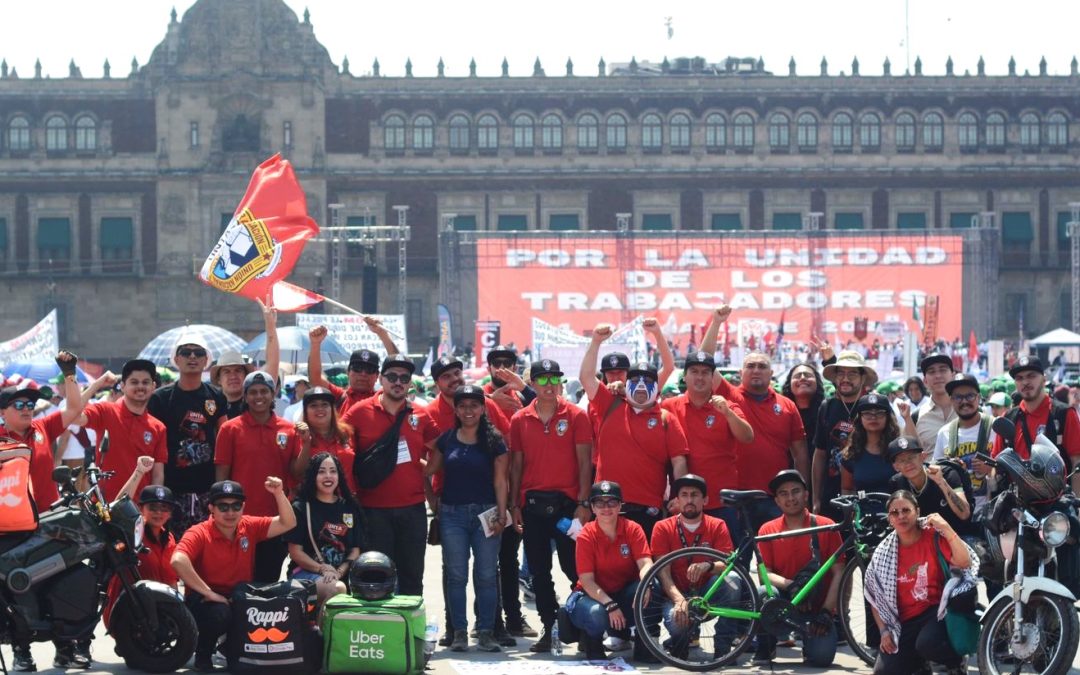
Jan 6, 2025
App-based delivery drivers and drivers paid the minimum wage in Mexico celebrated the holidays with new legislative reform that recognizes them as workers and ensures their access to social security, accident insurance, pensions, maternity leave, company profits and a Christmas (holiday) bonus.
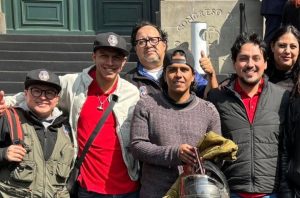
App-based delivery drivers and drivers paid the minimum wage in Mexico are now recognized as workers and have access to social security, accident insurance, pensions, maternity leave and company profits. Credit: UNTA
The law, introduced by Mexico’s President Claudia Sheinbaum on October 15, passed with full approval by the lower house and the Senate, which voted in December. It recognizes gig workers as employees, entitled to worker benefits and protections under Mexican law.
Some 658,000 workers are employed across Mexico on digital platforms, with 41 percent earning above the minimum wage. The National Union of App Workers (Unión Nacional de Trabajadores por Aplicación, UNTA) campaigned for the new law, taking a key role in urging its passage. Because of its advocacy, up to 2.5 million workers, according to Mexico’s government, will now have access to important social protections and benefits.
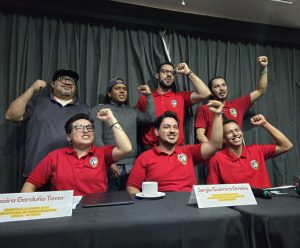
Mexico app-based drivers took part in a media conference as part of the campaign to pass a landmark law covering platform workers. Credit: Rubén Piña
In a media conference with its partner, the Solidarity Center, UNTA members expressed support for the regulation and also highlighted areas for improvement, such as recognizing connection time as part of total work hours. UNTA is an affiliate of the International Transport Workers’ Federation (ITF) and part of its Latin American Platform Workers’ Network.
“This reform reaffirms what we have been saying for years: We are workers,” says the General Secretary of UNTA, Sergio Guerrero. “And after years of hard struggle, this historic achievement contributes to the dignity of digital workers in Mexico, Latin America and the world.”
Ensuring Decent Work for App-Based Jobs
With few formal economy jobs available, workers worldwide are turning to the platform-based economy to support themselves and their families. While the rapid increase in app-based jobs offers millions of workers additional avenues to earn money, it also creates new opportunities for employer exploitation through low wages, lack of health care and an absence of job safety.
According to the International Labor Organization (ILO), digital platforms have created new opportunities and blurred the labor relationship between employers and workers. As a result, the digital platform work model does not adhere to standards of decent work, or fundamental ILO treaties (“conventions”), especially those on freedom of association, collective bargaining and discrimination in employment and occupation. Digital platform workers often earn low wages and lack access to social protections, minimum wage protections, employment benefits such as paid vacation and opportunities for collective bargaining.
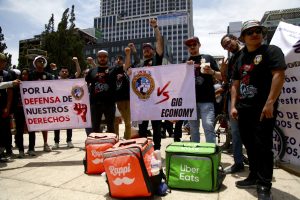
App-based drivers in Mexico waged multiple rallies in support of decent work. Credit: Iván Stephens
As in Mexico, app-based workers who drive motorbikes, bicycles and cars to deliver food and transport passengers receive no paid sick leave or vacation. They work long hours and rush between deliveries, risking their safety because if they do not, the app—via the company—punishes them by lowering pay. When drivers or deliverers are injured, they receive no compensation from their employers.
In Mexico, the law now addresses such issues, ensuring that workers have the flexibility to define their own working hours and requiring the employer—such as Didi, Rappi and Uber—to register workers in the nation’s social security program, covering occupational risks and providing access to health and housing benefits. Companies are required to register contracts with the government, which must detail working hours, income and algorithmic management rules.
Further addressing what workers describe as the company’s frequent abuse through algorithms, the law prohibits companies from charging for the use of the platform and obliges them to issue detailed payment receipts and respect digital disconnection outside working hours. It prohibits companies from manipulating workers’ income to avoid their classification as dependent on employers of digital platforms and blocks the collection of fees from workers for registration, use, separation or similar concepts related to the employment relationship.
In Mexico, digital companies now must guarantee the publication of algorithmic management policies and may not manipulate income to distort the employment relationship or carry out contractual simulations. The law also prohibits withholding of workers’ wages. The new law in Mexico is one of the most progressive in the world in regulating work through digital platforms, guaranteeing fundamental labor rights.













 Cotton—in t-shirts, jeans and many household items—is so common, most of us do not give it a second thought. But for decades, millions of people, sometimes including children, were forcibly mobilized by the Uzbekistan government to harvest cotton for state-owned enterprises. Uzbekistan is the world’s sixth largest producer of cotton, producing over 1 million tons annually and employing around 2 million workers.
Cotton—in t-shirts, jeans and many household items—is so common, most of us do not give it a second thought. But for decades, millions of people, sometimes including children, were forcibly mobilized by the Uzbekistan government to harvest cotton for state-owned enterprises. Uzbekistan is the world’s sixth largest producer of cotton, producing over 1 million tons annually and employing around 2 million workers.




